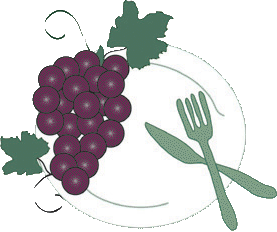
For the past couple of days, at bottle shops and bookstores around town (12th and Olive, Elliott Bay Books, The Local Vine), Seattle wine lovers had the opportunity to meet the new icon of American curiosity (and irreverence) about wine, Robert Camuto, author of the smash bestseller, Corkscrewed. There's a reason for the fuss: Camuto, a serious journalist, has written a heartfelt, perceptive analysis of the modern French wine industry and concludes, not surprisingly, that it's fallen victim to technology, banalization, and an unfortunate public indifference to quality. In that sense, Camuto is a sort of reverse Bernard-Henri Lévy, the outsider who dares critique an entrenched society.
The model for Camuto's book is the "wine-road" genre, pioneered by the granddaddy memoir, Frederick Wildman's A Wine Tour of France, in the early 1970s. A generation later came the now-classic Adventures on the Wine Route, published by wine merchant Kermit Lynch, a hymn to small-scale, artisanal wine producers. Today, of course, any blogger with a laptop churns out culinary adventure posts, Cornichon being one of hundreds, if not thousands of wine-&-food sites. What distinguishes Corkscrewed from the pack of self-absorbed cud-chewers is the quality of its detailed reporting.
Not without humor or self-awareness, Camuto sets out to discover the soul of French winemaking. A political reporter, Columbia journalism grad and founder of the Fort Worth Weekly, he has lived in the south of France with his French wife for the past decade and has been writing for Washington Post and Wine Spectator. Now, even as he sits at elaborate banquets in the great châteaux of Bordeaux, tasting legendary wines in the company of owners and cellarmasters, Camuto is uneasy.
He appreciates the great and powerful bottlings but his heart is with the neglected and misunderstood. He follows the fortunes of an iconclastic insider, François des Ligneris, who challenges the new order of estates owned by banks and insurance companies. Ironically, des Ligneris eventually sells the family property, Château Soutard (his sisters are majority owners), and starts all over in the Languedoc. Camuto goes to Alsace and picks grapes (hard work!); in the Loire he tastes actor Gérard Dépardieu's wines ("bombastic," "showbiz"). In the northern Rhone he disdains the six-million-bottle producer Guigal in favor of the artisanal Jean-Michel Stephan. He finds his Holy Grail, the symbol of the return to a more artisanal style of wimekaing, in the Ardèche, where a young winemaker named Christophe Reynouard has made his mission in life the return of a grape variety called chatus. Neglected and misunderstood on its home soil, the ugly duckling that is chatus turns into a swan on the other side of the Alps, in Piedmont, where it's known as nebbiolo, the very pinnacle of Italian grape hierarchy.
At the tastings in Seattle, Camuto presented not only wines from his favorites in the Languedoc and Provence, but two bottlings from Nicolas Joly in the Loire, whose family property, La Coulée de Serrant represents the epitome of biodynamic viticulture. One hundred percent chenin blanc, yet unlike anything you've ever had in your mouth, a single taste of Joly's wines will force you to rethink the very meaning of wine. You may not "like" it, may not "understand" what it is or where it's coming from, but you stand in awe of its uniqueness, its lush, indescribable perfection. It is art, it is religion, it is revelation.
Reviewing Corkscrewed for the New YorkTimes, wine editor Eric Asimov of the New York Times called it "my favorite new book." Gourmand's World Cookbook Awards named it the "Best Book of the Year on French Wines." Even Le Figaro likes it, and welcomes the publication of a French edition later this year. High praise indeed.
If I have a quibble, it would be that Camuto almost reflexively dismisses large-scale producers. Yet, that production capacity of six million bottles requires Guigal to buy tons and tons of grapes from growers large and small. So what if Jean-Michel Stephan says he keeps the best for himself; he's got an outlet for the rest. Were it not for négociants, smaller growers would have to sell every drop, every bottle themselves, an invitation to catastrophe. The tension between artisan-grower and négociant-marketer is part of what makes the wine world turn. My experience is that both parties benefit, and so does the consumer, who has a real choice: well-made if predictable "supermarket" wines, and even better, if occasionally quirky, "artisan" wines Standardization versus originality: you pays your money, you takes your choice. And you don't get screwed.
Posted by Ronald Holden at February 18, 2009 10:30 AM | TrackBack

The International Kitchen
Cooking school vacations in Italy, France & Spain.


 Who links to me?
Who links to me?